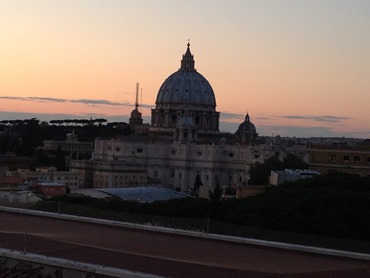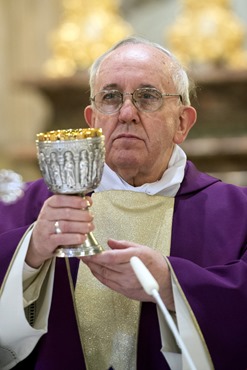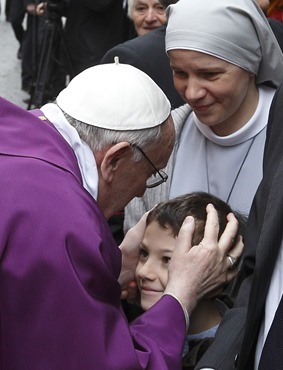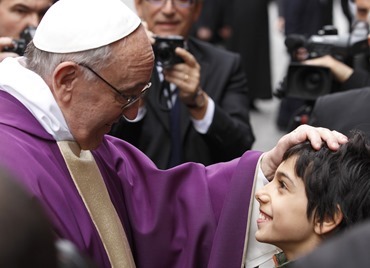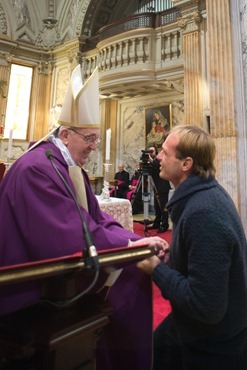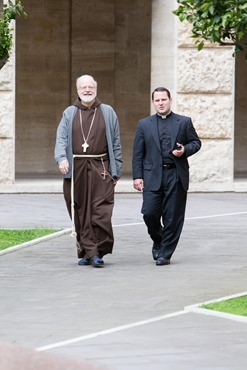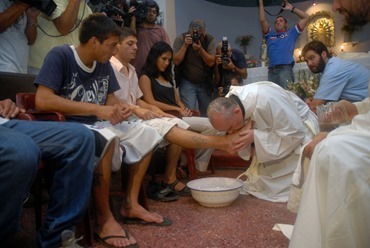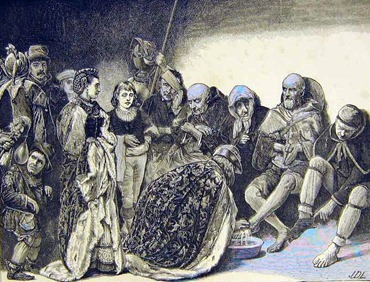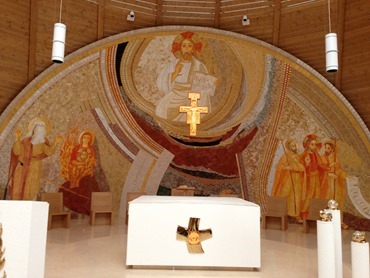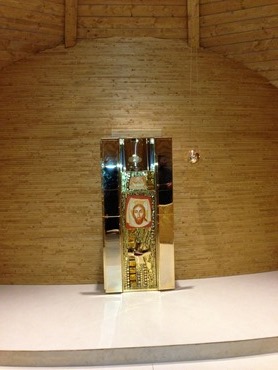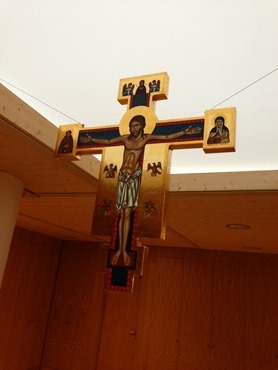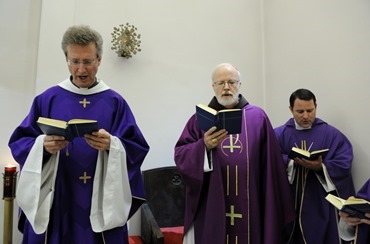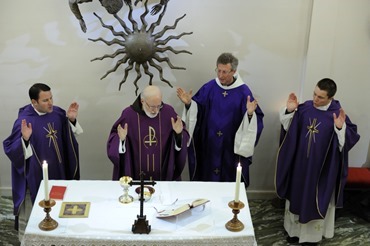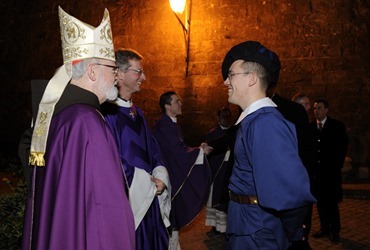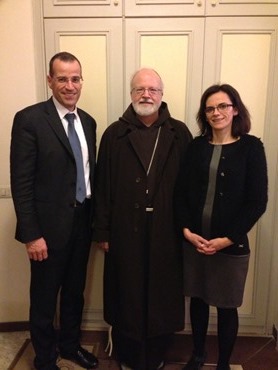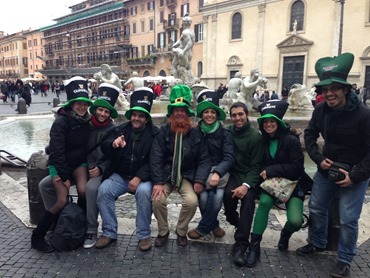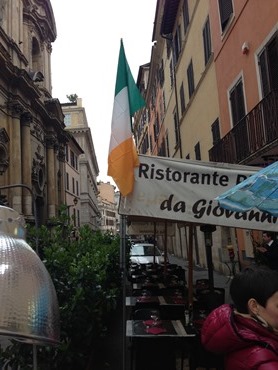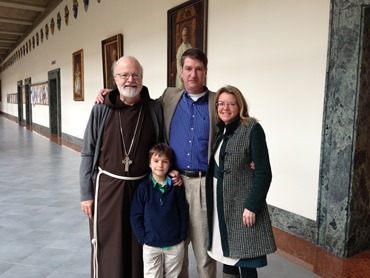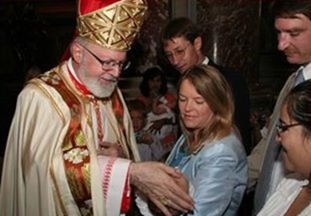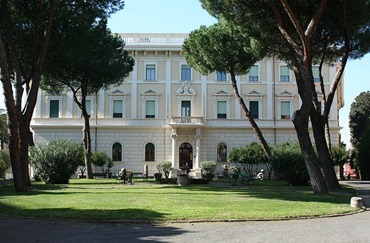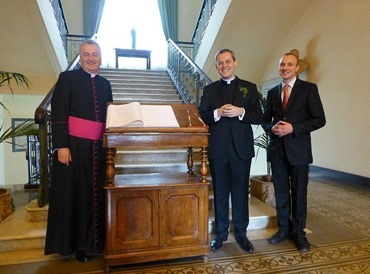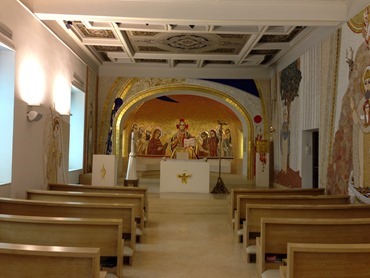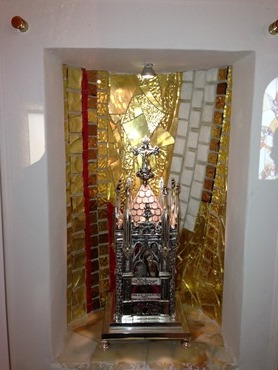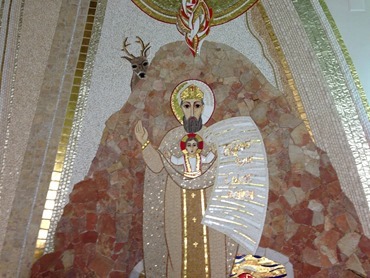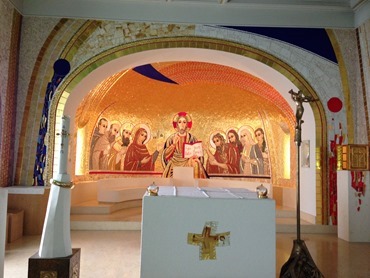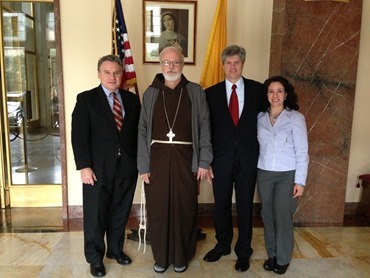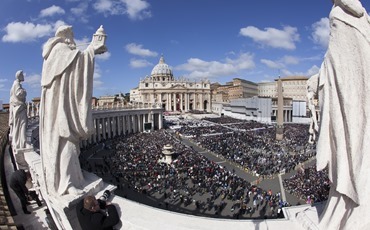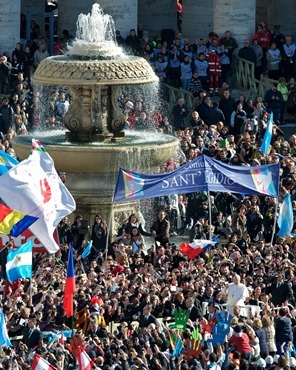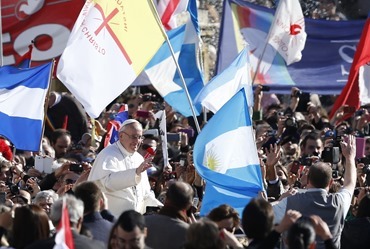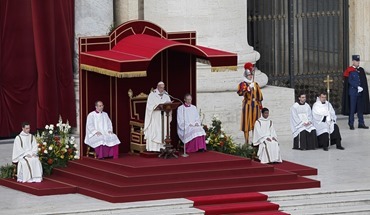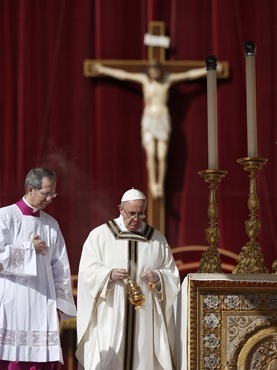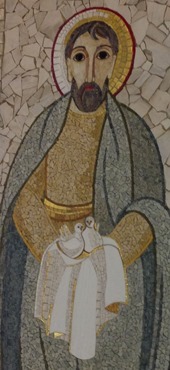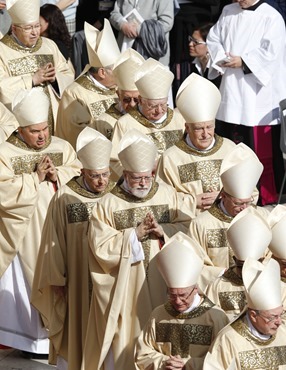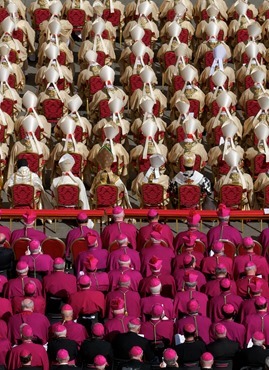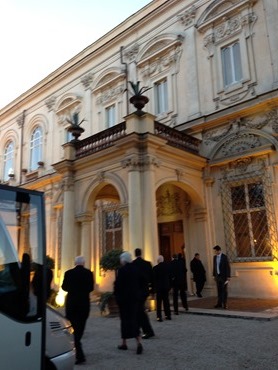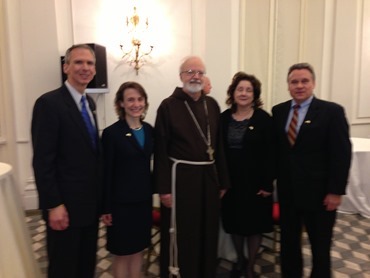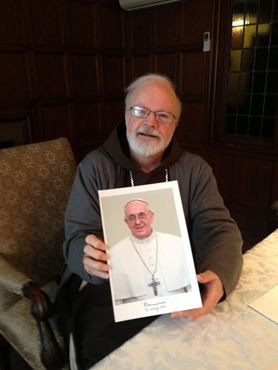Since the election of our new Holy Father I have been in Rome waiting for the feast of St. Joseph and the inaugural Mass. When I left for Rome, we had already made reservations to come back on the 21st, imagining that perhaps St. Joseph’s Day would be the best day for the celebration to inaugurate the Holy Father’s ministry. Still, it is the longest time I have been out of the archdiocese! But, of course, I was in constant contact with the archdiocese by telephone, Skype, and email.
This is the view from my room at the North American College
During this past week we were able to appreciate how the Holy Father’s simplicity, his love for the poor and his accessibility are going to be hallmarks of his papacy. Even the way he celebrates the Mass is much more like the parish Masses that our Catholic people are used to experiencing in their local churches.
At Santa Anna, where he celebrated Mass on Sunday for the local parish of Vatican City, he greeted people at the door, the way that pastors have done in the United States since I was a young priest. Although, as many young priests here are amazed when I tell them this, when I was growing up a priest never greeted the people at the door.
I remember as a deacon being assigned to St. Matthew Cathedral and Msgr. Kuhn walked to the back of the church after Mass to greet the people. I remember being embarrassed at first, but now this has become a wonderful custom, that though it was begun by the Protestants, it does give people that moment to encounter their parish priest and begin to know him, and for the priest to begin to recognize his parishioners. The Holy Father did that at Santa Anna, which I think shocked the whole world.
Also, during the course of the week, I had written the Holy Father a note and asked my priest secretary, Father Jonathan Gaspar, to take it down to him at the Domus Santa Martha, since the Holy Father has not yet moved into the Apostolic Palace.
Father Jonathan Gaspar
And I said to Father Jonathan, “I want you to give this letter to someone who will put it into the Pope’s hands. I do not want it being passed from person to person.” So, when Father Jonathan got to the Domus, he spoke to the receptionist at the desk, who said that if he left to the note with her she would have to give it to someone else and then she did not know what route it would take before it got to the Holy Father, but she said that she would call the Pope’s secretary, Msgr. Alfred Xuereb.
So she called the Msgr. Xuereb and he said “Just bring the letter up.” So Father Jonathan took the letter up, and gave it to the Msgr. Xuereb but then the Pope appeared and started speaking with Father Jonathan. Father Jonathan spoke to him in Spanish, identified himself as my secretary, and they went on to have a wonderful conversation. Afterwards, Msgr. Xuereb told Father Jonathan that he had had one of the first private audiences with the new Holy Father!
That is just another indication of the directness, informality and warmth of the Holy Father which, for many, is very disarming and, at the same time, very refreshing. Of course, all of us are very concerned and we want him to be safe. We can understand that in today’s world someone in his position cannot be as available as perhaps he would like, but certainly we see the Holy Father’s intention is to be close to the people.
I have also heard that he is going to celebrate the Mass of the Lord’s Supper on Holy Thursday in a Rome prison and wash the feet of some of the young detainees, as an occasion to underscore the Church’s commitment and preferential love for the poor.
As a cardinal, Pope Francis used to do that in his archdiocese
Holy Thursday is a very fitting time for that and we have a very long history of that in the Church. For example, I recall that in England during the Middle Ages, on Maunday Thursday the king would actually wash the feet of beggars and give each one of them a gold coin.
One year, we did something similar here at the Cathedral, bringing people from Pine Street Inn to have their feet washed at the Holy Thursday liturgy.
In the Church, there has often been an association of Christ’s commandment that we love one another as directed in a very special way to the sick and to the poor. That was ritualized in Holy Thursday ceremonies, and I was very touched to hear that our Holy Father is going to emphasize that again.
– – –
On Saturday, I went to have lunch with the Minister General of the Capuchins at the Collegio Internationale San Lorenzo da Brindisi where we have about 150 – 200 young Capuchin priests from all over the world who are studying in Rome. Our Minister General has moved our Curia there because they are renovating the monastery in Rome.
So, I went there to have lunch with him and Brother Mark Schenk, who is one of the General Definitors and is also from the United States. Our Minister General is Brother Mauro Jöhri, who is from Switzerland. So, it was kind of a Swiss–themed day, being with our Father General and then celebrating Mass with the Swiss Guards in the afternoon!
I have included pictures of the renovated Chapel at the collegio that was done by Father Mark Rupnik, a Jesuit who teaches at the Gregorian University.
He is a theologian and an artist who is famous for his iconography. He is the same person who did the tomb of St. Padre Pio in San Giovanni Rotondo. In fact, when I was at a meeting last year with the 90 Capuchin bishops from throughout the world at San Giovanni, Father Rupnik was invited to give us an explanation of all the icons. It was like a retreat, it was such a beautiful experience. So, I was very happy to see that his work was also used at the Chapel in San Lorenzo.
– – –
Then, as I mentioned, in the evening I went to celebrate Mass in the Chapel of the Swiss Guard within their barracks inside Vatican City. The chaplain is a French–Swiss priest, Father Alain de Raemy.
With Father Alain de Raemy
The Mass was celebrated in Italian, French and German. Most of the Swiss Guards are German-speaking, but there are also some Italians and French. Of course Italian would be the lingua franca that they all speak. Some of the Swiss Guards have visited us in Boston because we have our own former Swiss Guard here, Andreas Widmer, who makes sure that when Swiss Guards come to visit him that we have a chance to greet them also.
With Daniel Anrig, the Commandant of the Swiss Guard with his wife Maria
Also during my time in Rome, I was invited to dinner with the head of the Vatican Corpo della Gendarmeria, Dr. Domenico Gianni, the other group that is responsible for the protection of the Holy Father.
– – –
During the weekend, though I could not be present, I was happy to be participate at least through Skype with two vocation discernment retreats that were going on in the archdiocese.
Friday and Saturday I gave a conference to the men at Blessed John XXIII National Seminary and to the men who are at the Marion Center as part of the vocation retreat sponsored by St. John’s Seminary. There were more than 60 young men who run these retreats. Msgr. Jim Moroney gave the talks that I had planned to give, and they also had a talk from the rector at Blessed John Seminary, Father Bill Palardy.
Father Dan Hennessey, our vocations director, tried to take a picture of me talking via Skype, but he took the photo just when I was showing them the coat of arms of Cardinal Bergoglio… you can see some of the prospective seminarians in the small screen watching the talk.

The motto, “Miserando atque Eligendo” means “because He saw him through the eyes of mercy and chose him” or more simply, ‘having mercy, he called him”
– – –
On Sunday we marked St. Patrick’s Day.
As you can see, the spirit of St. Patrick’s is alive and well in Rome
There was a large Mass at the North American college, presided by Cardinal George who gave a magnificent homily. I always enjoy his depth of analysis of different situations.
After the Mass there was a St. Patrick’s Day brunch.
At that Mass were present friends of mine, Sean Kennedy and his wife, Gina. Sean had been a lay missionary in the Virgin Islands and did a wonderful job running our homeless shelter, which we called called “Bethlehem House”, because there was no room at the inn.
He is a Georgetown graduate who was part of the Jesuit Volunteers in the Samoan islands and then came to the Virgin Islands. I performed his wedding there and then baptized his son, Declan, at St. Peter’s Basilica some years ago because he and Gina had been living in Rome working for the United Nations and for FAO, which is the food organization.
This is the photo of Declan’s baptism in 2006.
– – –
That day, I also went to the Pontifical Irish College to mark St. Patrick’s Day.
Father Ciaran O’Carroll is the rector there.
Father O’Carroll welcomed the guests
There were many representatives from the Irish government there from Dublin as well as local ambassadors, many Irish ex-pats who live in Rome, and many of the Cardinals who are Irish.
It was a lovely celebration, though they did not serve the traditional Irish “Seder meal” of corned beef and cabbage. However, I was struck by the fact that the food of the plate was green and orange, the colors of the Irish flag.
I want to share with you some pictures of the chapel that has been renovated in the Irish College, done by the very same artist to who did the Chapel for the Capuchins, Father Marko Rupnik.
– – –
On Monday, Congressman Chris Smith and Congressman Jeff Fortenberry and his wife Celeste came right from the airport to see me.
Both representatives are great champions of the pro-life cause in Congress. We had a wonderful meeting. They were part of the congressional delegation attending the Holy Father’s inauguration Mass, along with Congressman Lipinski who is the head of the Pro-Life Caucus in Congress. Marie Smith is also very involved nationally with the pro-life cause.
– – –
The following day was the Inaugural Mass. It was a miraculously picture-perfect day that St. Joseph gave to us, because it was raining both before and after the Mass.
The night before, we went out to have pizza the seminarians and were walking back at around 10 o’clock at night to the seminary and we saw the young people streaming towards St. Peter’s Square with their backpacks to sleep overnight to get a spot at the Mass. It was like a World Youth Day!
The Mass was so beautiful to have on the Feast of St. Joseph.
St. Joseph has always been a very important part of my life and so during the Mass I remembered the Mosaic of St. Joseph with the two turtledoves that I had photographed at the Irish College the day before.
You do not often see that portrayal of St. Joseph, but I like it very much because, at the Presentation, our Blessed Mother would have been carrying Jesus, so Joseph would have been in charge of the doves. The beautiful thing about that is that the Jewish law said that when you brought your firstborn child for presentation (because the firstborn child was spared by the Passover of the Angel, you are giving your firstborn child to God) the Jewish family was supposed to sacrifice a lamb. But the law said, if you were poor, you could sacrifice two turtledoves. Mary and Joseph were poor people, so they were making the sacrifice of the turtledoves.
I thought the homily was so beautifully put, with the Holy Father calling upon us to be, like Joseph, guardians and to take care of creation, of each other, and in particular to care of the poor. He spoke about how parents take care of children and then, later, the children take care of their parents. I thought that was certainly a very beautiful pro-life theme. We are the people of life: we take care of the child in the womb, we take care of the newborn baby and then we take care of the elderly and those who have died.
Here is the text of Pope Francis’ homily:
Dear Brothers and Sisters,
I thank the Lord that I can celebrate this Holy Mass for the inauguration of my Petrine ministry on the solemnity of Saint Joseph, the spouse of the Virgin Mary and the patron of the universal Church. It is a significant coincidence, and it is also the name-day of my venerable predecessor: we are close to him with our prayers, full of affection and gratitude.
I offer a warm greeting to my brother cardinals and bishops, the priests, deacons, men and women religious, and all the lay faithful. I thank the representatives of the other Churches and ecclesial Communities, as well as the representatives of the Jewish community and the other religious communities, for their presence. My cordial greetings go to the Heads of State and Government, the members of the official Delegations from many countries throughout the world, and the Diplomatic Corps.
In the Gospel we heard that “Joseph did as the angel of the Lord commanded him and took Mary as his wife” (Mt 1:24). These words already point to the mission which God entrusts to Joseph: he is to be the custos, the protector. The protector of whom? Of Mary and Jesus; but this protection is then extended to the Church, as Blessed John Paul II pointed out: “Just as Saint Joseph took loving care of Mary and gladly dedicated himself to Jesus Christ’s upbringing, he likewise watches over and protects Christ’s Mystical Body, the Church, of which the Virgin Mary is the exemplar and model” (Redemptoris Custos, 1).
How does Joseph exercise his role as protector? Discreetly, humbly and silently, but with an unfailing presence and utter fidelity, even when he finds it hard to understand. From the time of his betrothal to Mary until the finding of the twelve-year-old Jesus in the Temple of Jerusalem, he is there at every moment with loving care. As the spouse of Mary, he is at her side in good times and bad, on the journey to Bethlehem for the census and in the anxious and joyful hours when she gave birth; amid the drama of the flight into Egypt and during the frantic search for their child in the Temple; and later in the day-to-day life of the home of Nazareth, in the workshop where he taught his trade to Jesus.
How does Joseph respond to his calling to be the protector of Mary, Jesus and the Church? By being constantly attentive to God, open to the signs of God’s presence and receptive to God’s plans, and not simply to his own. This is what God asked of David, as we heard in the first reading. God does not want a house built by men, but faithfulness to his word, to his plan. It is God himself who builds the house, but from living stones sealed by his Spirit. Joseph is a “protector” because he is able to hear God’s voice and be guided by his will; and for this reason he is all the more sensitive to the persons entrusted to his safekeeping. He can look at things realistically, he is in touch with his surroundings, he can make truly wise decisions. In him, dear friends, we learn how to respond to God’s call, readily and willingly, but we also see the core of the Christian vocation, which is Christ! Let us protect Christ in our lives, so that we can protect others, so that we can protect creation!
The vocation of being a “protector”, however, is not just something involving us Christians alone; it also has a prior dimension which is simply human, involving everyone. It means protecting all creation, the beauty of the created world, as the Book of Genesis tells us and as Saint Francis of Assisi showed us. It means respecting each of God’s creatures and respecting the environment in which we live. It means protecting people, showing loving concern for each and every person, especially children, the elderly, those in need, who are often the last we think about. It means caring for one another in our families: husbands and wives first protect one another, and then, as parents, they care for their children, and children themselves, in time, protect their parents. It means building sincere friendships in which we protect one another in trust, respect, and goodness. In the end, everything has been entrusted to our protection, and all of us are responsible for it. Be protectors of God’s gifts!
Whenever human beings fail to live up to this responsibility, whenever we fail to care for creation and for our brothers and sisters, the way is opened to destruction and hearts are hardened. Tragically, in every period of history there are “Herods” who plot death, wreak havoc, and mar the countenance of men and women.
Please, I would like to ask all those who have positions of responsibility in economic, political and social life, and all men and women of goodwill: let us be “protectors” of creation, protectors of God’s plan inscribed in nature, protectors of one another and of the environment. Let us not allow omens of destruction and death to accompany the advance of this world! But to be “protectors”, we also have to keep watch over ourselves! Let us not forget that hatred, envy and pride defile our lives! Being protectors, then, also means keeping watch over our emotions, over our hearts, because they are the seat of good and evil intentions: intentions that build up and tear down! We must not be afraid of goodness or even tenderness!
Here I would add one more thing: caring, protecting, demands goodness, it calls for a certain tenderness. In the Gospels, Saint Joseph appears as a strong and courageous man, a working man, yet in his heart we see great tenderness, which is not the virtue of the weak but rather a sign of strength of spirit and a capacity for concern, for compassion, for genuine openness to others, for love. We must not be afraid of goodness, of tenderness!
Today, together with the feast of Saint Joseph, we are celebrating the beginning of the ministry of the new Bishop of Rome, the Successor of Peter, which also involves a certain power. Certainly, Jesus Christ conferred power upon Peter, but what sort of power was it? Jesus’ three questions to Peter about love are followed by three commands: feed my lambs, feed my sheep. Let us never forget that authentic power is service, and that the Pope too, when exercising power, must enter ever more fully into that service which has its radiant culmination on the Cross. He must be inspired by the lowly, concrete and faithful service which marked Saint Joseph and, like him, he must open his arms to protect all of God’s people and embrace with tender affection the whole of humanity, especially the poorest, the weakest, the least important, those whom Matthew lists in the final judgment on love: the hungry, the thirsty, the stranger, the naked, the sick and those in prison (cf. Mt 25:31-46). Only those who serve with love are able to protect!
In the second reading, Saint Paul speaks of Abraham, who, “hoping against hope, believed” (Rom 4:18). Hoping against hope! Today too, amid so much darkness, we need to see the light of hope and to be men and women who bring hope to others. To protect creation, to protect every man and every woman, to look upon them with tenderness and love, is to open up a horizon of hope; it is to let a shaft of light break through the heavy clouds; it is to bring the warmth of hope! For believers, for us Christians, like Abraham, like Saint Joseph, the hope that we bring is set against the horizon of God, which has opened up before us in Christ. It is a hope built on the rock which is God.
To protect Jesus with Mary, to protect the whole of creation, to protect each person, especially the poorest, to protect ourselves: this is a service that the Bishop of Rome is called to carry out, yet one to which all of us are called, so that the star of hope will shine brightly. Let us protect with love all that God has given us!
I implore the intercession of the Virgin Mary, Saint Joseph, Saints Peter and Paul, and Saint Francis, that the Holy Spirit may accompany my ministry, and I ask all of you to pray for me! Amen.
The Cardinals celebrated the Mass with the Holy Father. It was reported that over 1 million people were in attendance. There were over 130 government representatives also there. It was just an extraordinary moment for the Church.
– – –
Wednesday there was a reception at the US Embassy to Italy sponsored by the American University in Rome.
It was held to honor the American Cardinals and Vice President Joe Biden. There was a White House delegation and a congressional delegation. I was very pleased that the congressional delegation included so many champions of the pro-life cause in our government.
With Congressmen Lipinski and Smith
– – –
Thank you for all your prayers and the large number of comments that were posted in these extraordinary days.
As he has requested, let us pray every day for the Holy Father and for the mission that the Holy Spirit has entrusted him.
Pope Francis gave us this photo as a present
when we met with him last Friday
As for me, I am very happy to be finally back in Boston and getting ready for Holy Week, even with snow on the ground!
Until my next post
In Christ
Cardinal Seán

